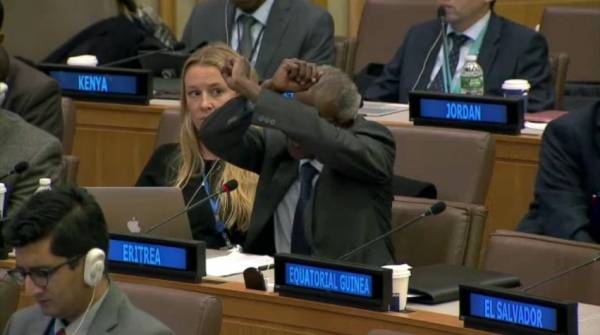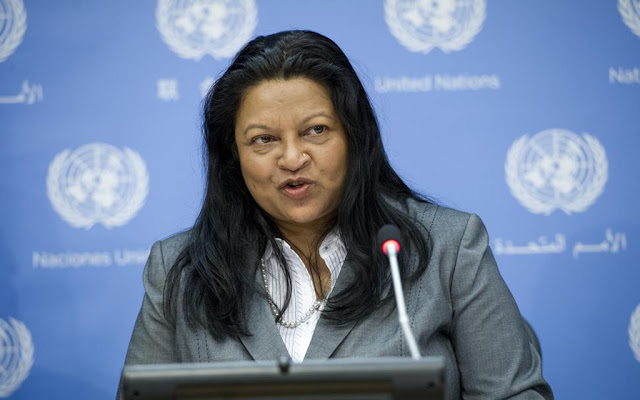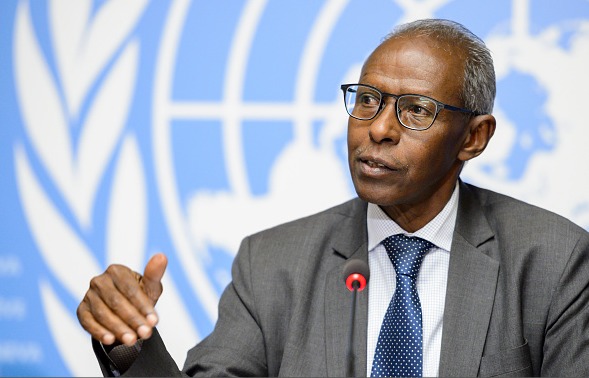Special for Africa Express
Saba Makeda
Somewhere inside Eritrea, 31st October 2016
During the UN meeting in New York, Mr Yemane Gebreab – special advisor for the Eritrean president Isaias Afeworki – raises and crosses his arms in an open and clear support for the Ethiopian people who are presently demonstrating against the Ethiopian Government and struggling for their democratic civil and political rights.
Mr Yemane Gebreab, how can you support the Ethiopian struggle and at the same time silence so many in Eritrea? The struggle of the Eritrean people for their democratic civil and political rights is just as valid as the struggle of the Ethiopian people? It is true that 100’s have been killed in Ethiopia – is it also true that they are counted and known? Eritreans disappear and cannot be counted. We disappear not only into unknown prisons but also in our silence, in our separation from each other. We disappear into our fear of each other of spies and informants and assassins. We disappeared for speaking our minds out and for having a point of view.
Mr Yemane Gebreab have you stopped to consider the consequences to Eritrea of your hypocritical gesture? Have you stopped to consider that, in a context where the current regime in Ethiopia already blames the State of Eritrea for supporting their opposition, your action could be seen at best as a confirmation of their suspicions and at worst a declaration of war? No. I do not think you have considered

The Eritreans who have spoken their mind or protested have done it in a calm manner writing letters, giving speeches. Even the soldiers that took over Forte Baldissera in 2013 limited their action to requesting the implementation of the 1997 Constitution. Our protests have mostly been polite requests asking that our civil and political rights would be respected. Our reward for such peaceful approaches is: intimidation, disappearances, torture, vilification insults we have become a frozen nation afraid of our own shadow – we have become the disappeared.
We are told that the crime of the people that you have disappeared and specifically the crime of such peoples as : Petros Solomon, Ogbe Abraham, Haile Woldentensae, Mahmud Ahmed Sheriffo, Germano Nati, Berhane Ghebre Eghzabiher, Astier Feshation, Saleh Kekya, Hamid Himid, Estifanos Seyoum, and (xi)Beraki Ghebre Selassie is “ … conspiracy to overthrow the legal government of the country …..” – In other words the disappeared are accused of Treason.
The People Front for Democracy and Justice (PFDJ) should stop referring to itself as the Legal Government, no such mandate has been given by the people of Eritrea. It is still the Transitional Government of Eritrea. Where is the proof of the Treason? In fact if there is a conspiracy it is that the people who have been disappeared are loyal to the Eritrean People and not the PFDJ or President Isias Afewerki . The Disappeared dared to see that in Eritrea, the PFDJ and the President are not one and the same.
The mantra of the Eritrean Government is that we must continue to sacrifice our youth to the mind numbing, soul destroying National Service/ Warasy Yekalo . We must sacrifice our elders to the same mind numbing soul destroying People’s Army because we are occupied by Ethiopia and therefore at war. For 15 years we continue to apply the “No talk” hard line approach to the border with no result. At what point do we declare that the policy has failed? When do we have an open national dialogue as to possible alternatives to solve the Badme issue? To keep on doing the same thing and to expect a different result is the very definition of madness. To suggest that alternative approaches be considered is to immediately become an enemy of the state and to be disappeared, silenced or otherwise vilified.
To continue on the present course is to accept that we have no relationship with Ethiopia, no relationship with Sudan, and definitively no relationship with Djibouti , and that our relationship with IGAD, the African Union, the UN and the EU will continue to be strained. To continue on the present course is to continue to alienate the youth and thus to ensure our limited progress towards sustainable development.
Mr Yemane you and the Government of Eritrea protests the work of the UN Commission of Inquiry on Human Rights in Eritrea as another ploy of Ethiopia or the West to destroy Eritrea. Completely by failing to understand that the Commission has done so much work not because of the support of the guidance of Ethiopia, but because of the work and the struggle of the Eritrean youth who want to have a voice and who want to defend and protect other Eritrean youth.
The same Eritrea youth want a country to be proud of are now demanding to know where their family members are . They have picked up the relay baton for the struggle for a free Eritrea and are following up the call of the Catholic Bishops of Eritrea and are asking the Government of Eritrea: “Where is my Father?”; “Where is my Mother? “; Where is my Sister?”; “Where is my Brother?“ It is time to provide a response that is not a put down or yet more vilification.
Both the Commission of Inquiry on Human Rights in Eritrea and the African Commission of Human Rights have found that the State of Eritrea has committed human rights violations.
The findings of the African Commission of Human Rights are the earliest and relate to a case that was brought before the African Commission of Human Rights – Liesbeth Zegveld and Messie Ephrem – v- Eritrea (No250/2002; (2003)).
Dr Liesbeth brought a complaint against the Government of Eritrea for the illegal detention of 11 former government officials namely: (i) Petros Solomon, (ii) Ogbe Abraham, (iii) Haile Woldentensae, (iv) Mahmud Ahmed Sheriffo, (v) Germano Nati, (vi) Berhane Ghebre Eghzabiher, (vii) Aster Feshation, (viii)Saleh Kekya, (ix) Hamid Himid, (x) Estifanos Seyoum, and (xi)Beraki Ghebre Selassie . The 11 were part of a group of 15 senior officials (i.e. G15) of the ruling party Peoples Front for Democracy and Justice (PFDJ) who had been openly critical of the Eritrean Government’s policies.

The complaint states that the arrests were in violation of Eritrean law as well as the African Charter on Human and People’ Rights. In this case the African Commission of Human Rights found that: “…the State of Eritrea is in violation of Articles 2, 6, 7(1) and 9(2) of the African Charter of Human and Peoples’ Rights”[1] ;and recommended that the detainees be compensated at the same time urged: “ ….the State of Eritrea to order the immediate release of the 11 detainees, namely : Petros Solomon, Ogbe Abraham, Haile Woldentensae, Mahmud Ahmed Sheriffo, Germano Nati, Berhane Ghebre Eghzabiher, Astier Feshation, Saleh Kekya, Hamid Himid, Estifanos Seyoum, and (xi)Beraki Ghebre Selassie”
To date, except for Saleh Kekya, the detainees have not been released and remain disappeared.
On 8 June 2016, the Commission of Inquiry on Human Rights in Eritrea released its second report[2]. The report was presented to the Human Right Council on 21 June. Specifically the Commission reported that: https://e.xpda.co/aO1w3E4sHWdmejz2Ha0nMJFiNA0 “… gross human rights violations it documented in its previous report ( ie 2015 report) persist, including arbitrary detention, enforced disappearances, torture, killings, sexual and gender- based violence, discrimination on the basis of religion and ethnicity, and reprisal for the alleged conduct of family members. In addition, many of those subjected to enforced disapperence in the past remaion unaccounted for. “
“While the Commission notes the State’s increased engagement with the international community, there is no evidence of progress in the field of human rights. Human rights violations are cited as the main motivating factor for departure by the consistently large number of Eritreans fleeing the country, including by the rising number of unaccompanied minors.”
Eritreans continue to be subjected to indefinite military/national service. The Government has recently confirmed that there are no plans to limit its duration to the statutory 18 months. Conscripts are drafted for an indefinite duration of service in often abusive conditions, and used as forced labour. “
The 2016 report of the Commission of Inquiry confirmed the reccomendations of the 2015 report and made the following additional recommendations: that: the mandate of the Special Rapportour for Eritrea be extended; the UN Security Council refer the situation in Eritrea to the International Criminal Court and impose travel bans and asset freeze, on persons responsible for crimes against humanity or other gross violation s of human rights; the African Union establish an accountability mechanism to investigate, prosecute and try individuals reasonably believed to have committed crimes against humanity.

On 29 October 2016, Mr Mike Smith presented the oral update and confirmed the UN Commissions’ report and the reccomendations therein specifically identifying the following categories of persons as the main perpetratros of Human Right abuses: the Eritrean Defence Forces, in particular the Eritrean Army, the National Service Office; the National Security Office; the Eritrean Police Forces ; the Ministry of Information; the Ministry of Justice; the Ministry of Defence; the People’s Front for Democracy and Justice; the Office of the President
Though the mandate of the Commission of Inquiry on Human Rights in Eritrea ended as of June 2016 the mandate of the Special Rapporteur continues.
The recommendations of the UN Commission of Inquiry on Human Rights in Eritrea clearly provide a clear link between the UN process and the African Union process and the struggle must continue.
Makeda Saba
makedasaba@gmail.com
[1] African Charter on Human and Peoples’ Rights:
Article 2 Every individual shall be entitled to the enjoyment of the rights and freedoms recognised and guaranteed in the present Charter without distinction of any kind such as race, ethnic group, colour, sex language, religion, political or any other opinion , national and social origin, fortune, birth or other status
Article 6 Every individual shall have the right to liberty and to security of his person. No one may be deprived of his freedom except for reasons and conditions previously laid down by law. In particular, no one may be arbitrarily arrested or detained
Article 7(1) Every individual shall have the right to have his cause heard. This comprises:
- The right to an appeal to competent national organs against acts violating his fundamental rights as recognised and guaranteed by conventions, laws, regulation and custom in force
- The right to be presumed innocent until proven guilty by a competent court or tribunal;
- The right to defence, including the right to be defended by the counsel of choice;
- The right to be tried within reasonable time by an impartial court of tribunal
Article 9(1) Every individual shall have the right to receive information
[2] (Commission, UN Human Right, June 08.2016; http://www.ohchr.org/Documents/HRBodies/HRCouncil/CoIEritrea/A_HRC_32_CRP.1_read-only.pdf )

